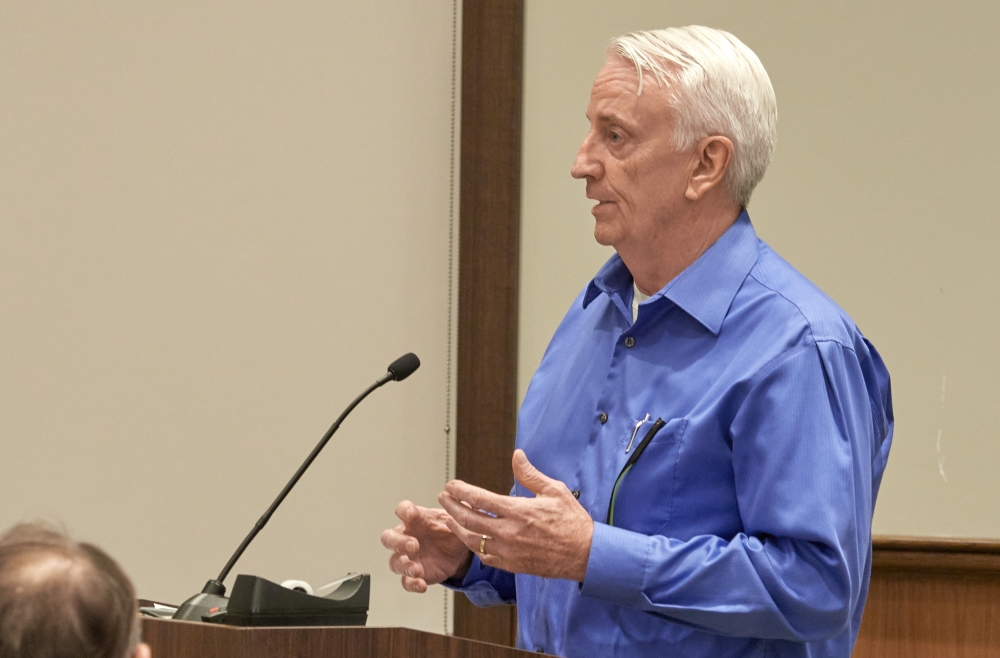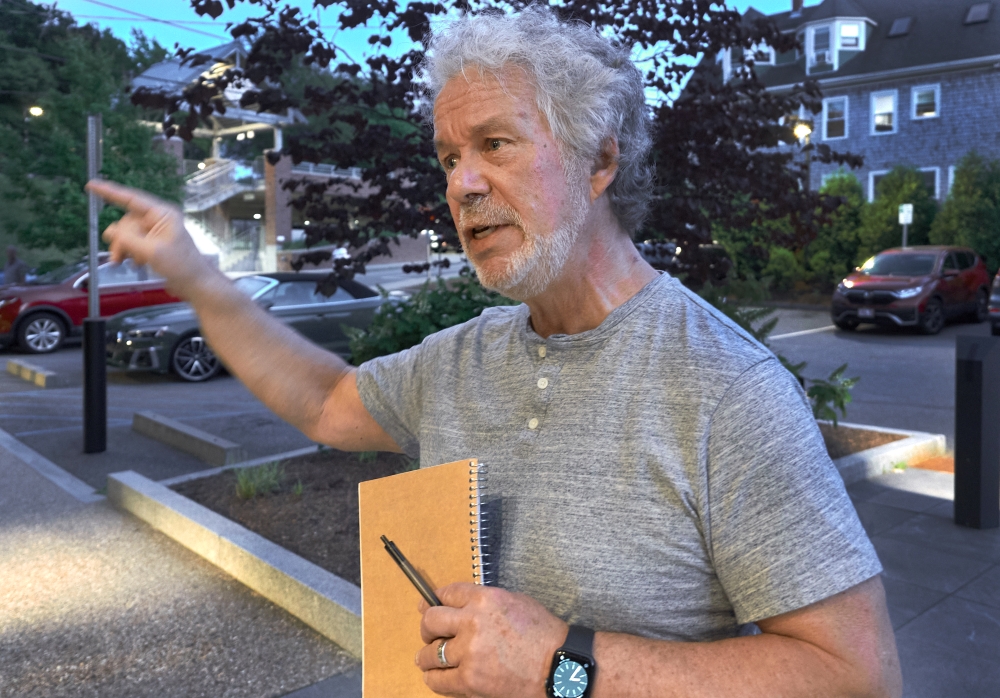The Select Board on Tuesday voted to remove Bill Keohan from the Community Preservation Committee, which he has chaired since its inception in 2002.
It also ousted committee member Allen Hemberger, a supporter of what Keohan has characterized as an effort to keep recommendations on spending Community Preservation funds independent of town politics.
They were replaced by former Plymouth fire chief Edward Bradley and Len Levin, an information technology consultant and a member of the Charter Review Committee who has lived in Plymouth since 2021.
The Community Preservation Committee manages about $4 million a year in funds raised under the Community Preservation Act. It recommends grants to Town Meeting. The Community Preservation Fund is financed by a 1.5 percent surcharge on property taxes.
Keohan’s latest three-year term was set to expire June 30. Under his leadership, the committee has recommended funding for hundreds of affordable housing units, the preservation of thousands of acres of open space, and the restoration of recreational areas and many town buildings, including the Spire Center, the Center for the Arts, and the 1820 Courthouse, now a part of Town Hall.
“It’s time to put more emphasis on affordable housing,” Bradley told the board.
Levin said he, too, wants the CPC to focus on affordable housing.
“Would it be great to fix a park?” he said. “Would it be great to fix a building? Yes. But I think for the people who have lived in Plymouth their lives and paid into that fund, whatever we can do to use that fund to help them be able to remain in Plymouth is a priority.”
Hemberger explained to the board that the CPC does not decide funding priorities. Rather, it vets grants as they come in and makes recommendations to Town Meeting, which alone decides which projects to fund.
By law, the CPC must allocate at least 10 percent of Community Preservation funds to each of three categories: open space and recreation, affordable housing, and historic preservation. Another 4 percent may go to administrative costs. The balance can go to any of the three allowed categories.

It was clear from Tuesday night’s meeting, as it has been for some time, that the board wants the CPC to recommend more spending on affordable housing projects.
“Do you envision, if you were to be reappointed, that affordable housing would be a priority for your next term?” board vice chair Kevin Canty asked Hemberger. “Or would you still be looking at things as a level playing field, on a project-by-project basis, individual merit basis, without any of those larger policy considerations?”
Hemberger replied that because there are so many other sources of funding for affordable housing, sometimes the CPC receives no applications for it.
“We need the housing authorities to submit applications,” he said. “We don’t generate applications.”
Select Board member John Mahoney, who also serves on the CPC, pointed out that this year the committee submitted recommendations for $8 million for three affordable housing projects. He also noted that those projects changed from the time the CPC approved them to when Town Meeting voted on them, implying that Keohan had mismanaged the process.
For instance, an affordable housing project at Redbrook in South Plymouth was changed after the committee approved $4 million in funding for it by a vote of 4-2. Committee members Karen Buechs, Betty Cavacco, Mahoney, and Hemberger voted in favor of it, with Keohan and Russell Shirley in opposition, and Bill Fornaciari abstaining.
Keohan had raised concerns about awarding public money for the project since Makepeace – which developed Redbrook – has yet to fulfill a prior commitment to build 103 affordable housing units. Redbrook reworked the proposal to include more affordable housing units between the time the CPC approved the project and when Town Meeting approved it.
Another project, for a shelter for homeless families in the Plymouth Industrial Park to be run by the Plymouth Area Coalition for the Homeless, turned out not to count towards Plymouth’s inventory of affordable housing, as Keohan had mistakenly told the committee it would. Town Meeting approved the project anyway.
A third project involving affordable housing units was withdrawn after Town Meeting approved it because Keohan and Director of Planning Lee Hartmann mistakenly overestimated the number of units the town would be able to count towards its inventory of affordable housing.
Subsidized housing inventory matters because if less than 10 percent of a community’s housing is classified as affordable, state law allows developers to circumvent some zoning restrictions. About 6.9 percent of Plymouth’s rental units are deemed affordable.
Keohan attributed the changes that the projects underwent to the fact that the committee considered them hastily, sometimes days before they were to go on the town warrant for Town Meeting. The committee has since moved its deadlines to give itself and town staff more time to consider projects, he said.
A longstanding point of contention between Town Manager Derek Brindisi and the Select Board on one side and Keohan on the other was the appointment of a staff assistant for the committee. Keohan wanted to be able to interview and hire the assistant. Brindisi and the board wanted to making the hiring decision.
Select Board member Charlie Bletzer accused Keohan of having opposed the help of an assistant. Keohan denied that, saying he valued the work of the committee’s new assistant, Chelsea Westgate, but wanted to have a say in her hiring.
Bletzer also brought up an instance in which Keohan lost an email from a bidder for a demolition project. That meant that only two bids were considered in violation of the state’s procurement law, which requires three.
Canty, the only board member to vote for Keohan’s reappointment, praised his accomplishments.
“We’re literally sitting in a building that Mr. Keohan and his efforts helped not only to preserve, but also fund the reconstruction of,” Canty said.
But it appeared clear by the lack of comments from the other four board members that they had decided it was time for Keohan’s tenure to come to an end.
“I was taken aback that the other four cast their vote without any sort of rationale of why they would or would not support that kind of knowledge and performance,” said Mark Withington, who was in the audience.

Keohan’s replacement came despite a surge of popular support for him. He received hundreds of votes as a write-in candidate for the Select Board in the May town election, the result of a last-minute campaign to show solidarity with him that also included a letter signed by dozens of Plymouth residents. It was published in the Independent and delivered to the Select Board.
“I’m dismayed and my heart is broken,” said Ginny Davis, who stood to read the letter of support to the board the week before it dismissed Keohan. “He’s the one person that does this with purity of heart. He loves Plymouth. It’s kind of a travesty.”
Richard Serkey, a Town Meeting member who also addressed the board last week to support Keohan, characterized his removal as a power move by the Select Board.
“This board wants to exert more control over what projects the CPC recommends to Town Meeting,” Serkey said in a statement sent to the Independent. Serkey said the process began last year, when the board replaced longtime Community Preservation member Joan Bartlett with Cavacco.
“I’ve listened to your questions to Mr. Keohan tonight and in my opinion, the issues you raised, in many cases, amounted to pretexts for a decision you had already made ahead of time,” Serkey said in his statement, which was addressed to the Select Board.
“He was always working so hard to make sure that any possibility, especially of open space happened because if you do not act really quickly on those things, if you’re not seizing the opportunity, they go to developers,” said Frank Mand, vice president of the Southeastern Massachusetts Pine Barrens Alliance and a candidate for Planning Board in the May town election. “He’s had more of a positive effect on this community, probably, than any individual in the town.”
“I plan to stay involved in the process,” Keohan said after the vote. “I was active before the Community Preservation Act and I will continue to be active in the community on behalf of historic preservation, affordable housing, and protecting our natural resources and water.”
Fred Thys can be reached at fred@plymouthindependent.org.

